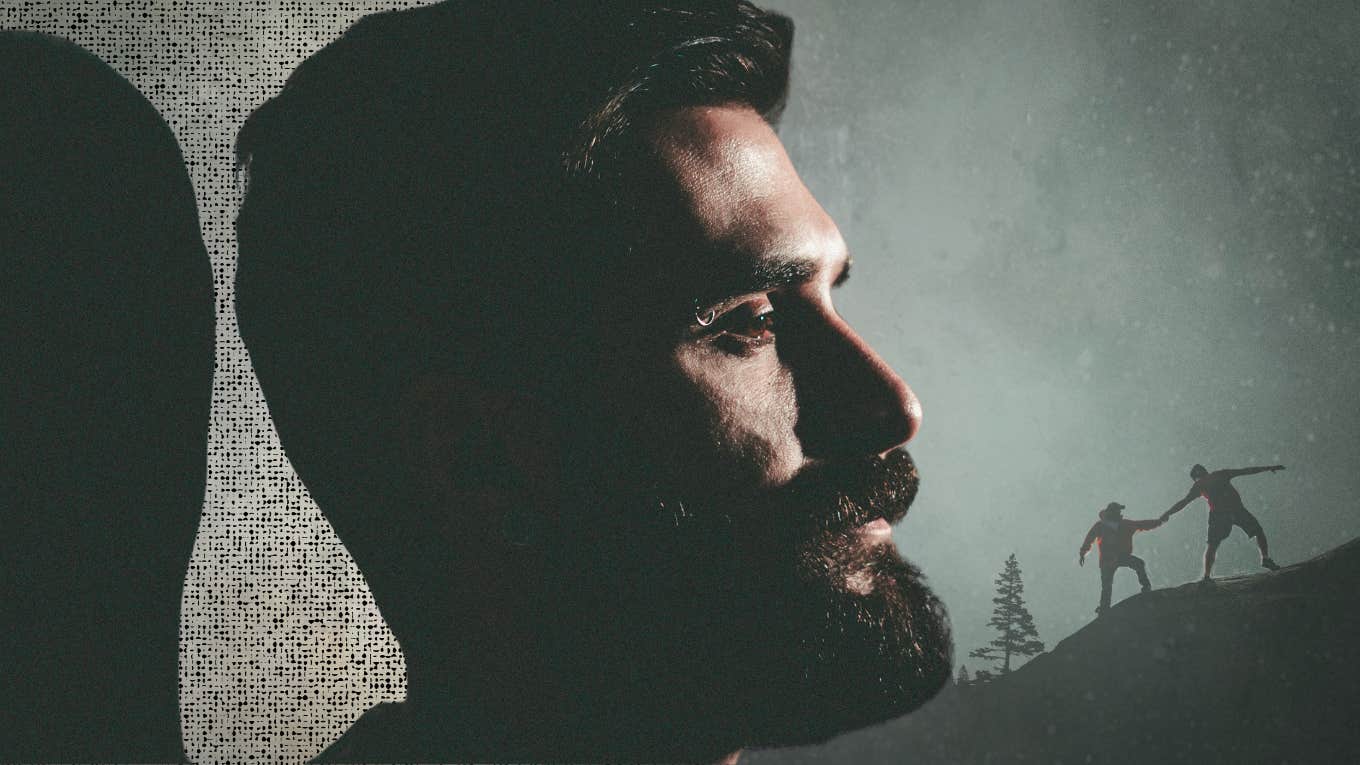7 Simple Things Men Can Do Now To Be Better Friends To Other Men
There's a mental health crisis among men, with loneliness at the core.
 vernonwiley | Canva, Vinicius "amnx" Amano | Unsplash
vernonwiley | Canva, Vinicius "amnx" Amano | Unsplash When I hear a guy tell me his partner is his best (meaning only) friend, I see a red flag go up.
The dynamics in a healthy relationship do not fulfill the needs of a complete human. This can only be done with the support of other relationships.
Men must let go of the notion that other men are their competition and shift the competitive nature into a team effort of supporting each other.
Our unhealthy beliefs around competition, self-sufficiency, and sexuality have brought us to a time where men are dropping like flies and becoming addicted at epidemic levels. It’s time to let go of the self-defeating attitude and start supporting each other.
Here are seven concrete ways men can be better friends to other men
1. Improve your intuition.
Start paying attention to the non-verbal communication of other men. If you see a friend doing more things alone, this is a sign he may be trying to deal with some stuff on his own. If your gut tells you something’s off, but you can’t put your finger on it, trust that something is off.
2. Acknowledge his pain.
Let him know you are aware he’s going through some stuff, and leave it at that. A response from him isn’t necessary.

Photo: Nadasaki via Shutterstock
3. Drop your shield first.
If you’ve had a relatable experience, sometimes sharing yours along with the emotions you felt can open a door for him. You may want to share something that prompts your tears. This may give him the implied consent he needs to shed his own.
Most of the men in my men's group (myself included) shared a feeling of discomfort when seeing another man cry. I would rather walk around naked in public than cry in front of another man.
And when you look at the suicide stats among men and couple them with how men deal with emotions like grief, sorrow, and anxiety, one might draw an even scarier conclusion.
Is it possible that men would rather die than cry?
I’m not talking about those instances when a few tears escape from his powerful grasp at his retirement party or daughter’s wedding. I’m referring to those moments when it feels like his whole world has been ripped from him, and he wants to drop to the floor and let everything go, but he can’t because he’s a man.
He believes:
- Men are in control.
- Men are self-sufficient and don’t ask for help.
- Men don’t let the competition see them sweat.
- Men don’t cry.
While many men will argue these outdated mantras don’t exist in their belief systems, it’s been my experience with myself and the men I’ve worked with that thousands of years of conditioning don’t disappear from the subconscious mind just because the conscious mind wants it to.
Often, when I’m coaching a man around his grief, and he feels the tears surfacing, he will either warn me that he’s getting emotional or he’ll apologize afterward, thereby confirming his belief that crying is something he shouldn’t be doing.
4. Hold space.
Let him know he can trust you. Keep his stuff confidential.
5. Just listen.
Sometimes, being quiet with some simple gestures is better than any words. Sitting quietly with another man is powerful and seldom practiced.
6. Don’t be Mr. Fix-it.
The last thing a man needs while processing his grief is another man giving him advice. This only serves to make him feel less of a man. Limit your dialogue to questions and reflections.
7. Be a man of service.
This doesn’t mean making him feel more helpless by asking him what you can do for him. Pay attention and look for opportunities to help out with some minor tasks. If you see his grass getting a little high, mow his lawn while he’s away. Anything you can do without blowing your own horn or making him feel any more helpless is a good idea.
The feelings of helplessness during times of grief, combined with the subconscious belief he must figure it out on his own, lead to even more isolation.
Often, he sees himself as one man against the world, and his only options are fight or flight.
His “fight” may include aggression and violence, a new unhealthy love relationship, or unsafe casual sex, just to name a few. His “flight” response usually shows up as addictions or in worse cases, suicide.
Men need to learn healthier ways to process emotions. I believe this has to begin with more men supporting each other.
Understanding our role as men can be challenging.
Connecting with other conscious men and sharing fears, tears, and ideas can be the starting point of reclaiming a man’s identity.
Greg Boudle is a recovery life coach, published author, and professional speaker.

